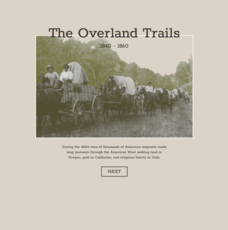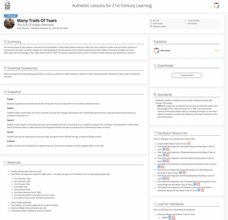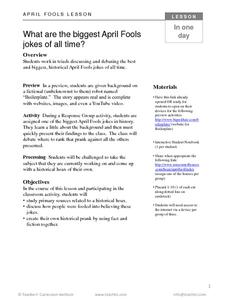PBS
Rosa Parks: Civil Rights Activist
Scholars examine the courageous efforts made by civil rights activist, Rosa Parks. Discussion questions and a brief writing assignment follows a short film. A photograph and a silent film delve deeper into Park's history and three...
US House of Representatives
A Picture is Worth a Thousand Words
Groups select a photograph from one of the four eras of African Americans in Congress and develop a five-minute presentation that provides background information about the image as well as its historical significance. The class compares...
Academy of American Poets
Teach This Poem: "Black Laws" by Roger Reeves
After investigating the Black Lives Matter movement, class members do a close read of Roger Reeves' "Black Laws." They write down words and phrases that rhyme, consider the kinds of rhymes used and their function in the poem. Scholars...
Benjamin Franklin Tercentenary
What Ben Read
Just what did Ben Franklin read? By juxtaposing Ben Franklin’s reading material as a young man with an analysis of his developed ideas, learners gain the opportunity to see how the influences of his youthful reading played out. Roman,...
American Battle Monuments Commission
The Great War: U.S. Division Under Allied Command
The victory of Allied forces in World War I is due in large part to the continued collaboration and support of the Allied divisions themselves. Learn more about the ways Australia, Britain, France, and the United States worked together...
Curated OER
Abigail and Mercy
Scholars examine three letters from Abigail Adams to Mercy Otis Warren, compare them to previous letters in the series, and note the change in tone in these letters she writes to her friend.
Curated OER
Celebrate Mathematics Awareness Month in Your Class
Learn the history and purpose behind this month dedicated to the exploration of numbers.
Council for Economic Education
The Columbian Exchange
What did you have for dinner last night? Many scholars ask that question without considering the history behind the foods they eat. Using a simulation, scholars investigate how the foods they eat are the product of the Columbian...
Benjamin Franklin Tercentenary
The Autobiography of Benjamin Franklin
Need a model for character education? Benjamin Franklin presents himself as in a constant state of striving to become the man he hoped to be, making his autobiography is far more accessible to learners than those of people who consider...
Benjamin Franklin Tercentenary
Ingenious: Franklin Assembles a Scientific Community
Few Americans have heard of the burgeoning scientific community known as the America Philosophical society, started by none other than Benjamin Franklin. With inquiry, research, and discussion, high schoolers come to understand their...
Albert Shanker Institute
Who Was Bayard Rustin?
Who was Bayard Rustin? Pupils analyze a series of primary source documents to learn about this important figure in the civil rights movement. The activity contains a short film to watch along with guiding questions and other resources...
The Alamo
The Alamo Then and Now
Reading about the Battle of the Alamo during the Texas revolution is one thing, but has the class seen it? Show them firsthand using an interactive resource. Scholars drag a mouse to view the surroundings of the Alamo in the past and as...
University of Richmond
The Overland Trails 1840-1860
What led Americans to head west in the 1800s? Using an interactive map and journals from those who traveled, pupils explore the stories of those who migrated. In addition, they see how the numbers fluctuated in response to the push-pull...
American Battlefield Trust
Joshua Chamberlain Lesson Plan
While Joshua Chamberlain's name is not as iconic as Abraham Lincoln or Robert E. Lee, he still played a pivotal role in the military engagements of the Civil War. Using two secondary sources—including one that draws heavily from his...
Center for History Education
Brown v. the Board of Education: Success or Failure?
Desegregation does not mean equality. An eye-opening instructional activity focuses on the impact of the Brown v. Board of Education decision to end school segregation. Scholars review a series of political cartoons to understand how the...
K20 LEARN
Oklahoma and Segregation
It was not just the states of the Deep South that practiced segregation. Young historians investigate the history of segregation and desegregation in Oklahoma. They begin by reading, annotating, and analyzing an article about the impacts...
K20 LEARN
Many Trails of Tears: The Era of Indian Removal
Cherokee, Chickasaw, Choctaw, Creek, and Seminole. All were forced off their ancestral lands in the southeastern United States as part of the Indian Removal Act of 1830. Young historians research the tribes' reactions to this removal and...
K20 LEARN
Tribal Sovereignty and the Indian Reorganization Act: Tribal Governments
Sovereign nations or wards? High schoolers investigate the history of the Indian Reorganization Act and other legislation that impacted Native Americans. They also research different tribes' constitutions, compare them to the U.S....
Curated OER
The New England Fishing Industry:Sea Changes in a Community
Explore New England's economic and cultural past and possible issues New Englanders will face in the future. Middle and high schoolers research the fishing industry and the need for regulation. They analyze the topography of New England...
Curated OER
How Did Different People Live in Ancient Egyptian Times
What was life like for ancient Egyptians? Well, that depends on a person's job or title. Find out what life was like for pharaohs, priests, scribes, peasants, nobles, and craftsmen in Ancient Egypt. Each slide contains an image and a...
TCI
What Are the Biggest April Fools Jokes of All Time?
After working in groups to analyze primary sources related to a historical hoax, learners will discuss how people managed to be fooled and work to identify one of the biggest April Fools jokes in history.
Columbus City Schools
Let’s Get Theoretical About Cells
Get up close and personal with cells in a hands-on journey to discover what makes up living things. Scholars learn valuable microscope skills, delve into the Modern Cell Theory, and gain insight into how cells reproduce. The included lab...
The Alamo
A Teacher’s Guide to Sam Houston
Need a teacher's guide all about Sam Houston and how he relates to the Texas Revolution? Look no further! The guide includes a timeline detailing Houston's life, important milestones, and relevant maps that include his movement around...
Stanford University
Japanese American Incarceration
Using documents, such as reports from government sources and civil rights activists, budding historians explore the justification for forcing hundreds of thousands of Japanese-Americans to leave their lives and re-evaluate that tragic...
Other popular searches
- Famous People in History
- Women in u.s. History
- Women in History
- Genocide in World History
- People in World History
- California History in 1920s
- Important People in History
- Lessons in Canadian History
- Minorities in Sports History
- Women in American History
- Famous Women in History
- Women History in China

























